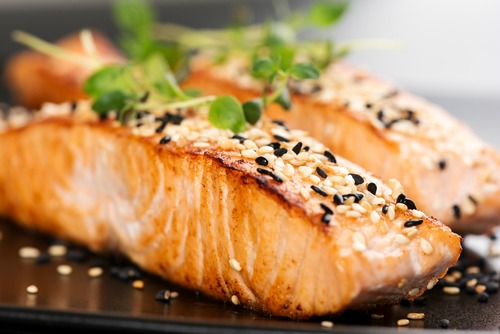Delicious foods you can eat now to replace vitamins

As the cold temperature sets in and coughs and colds spread, many are stocking up on vitamins that promise to boost their immune system.
But how effective are these supplements, and do we really need them?
The term vitamins and minerals simply refers to the nutrients that your body needs to function correctly, such as iron, calcium and vitamin C.
However, according to a 2013 study into chronic conditions, vitamin pills have virtually no long-term health benefits for well-nourished adults, and may even be harmful.
In fact, an investigation revealed that many supplements do not contain the ingredients they say they do or contain other ingredients that may not be on the label.
So what can we do?
Most experts say that if you’re eating a healthy diet and don’t have an underlying health conditions that interferes with your body’s ability to absorb nutrients from your food, you generally shouldn’t need to take supplements. The same vitamins and minerals are often available in food. Yes!
Here’s a list of several popular supplements, and foods that you should eat instead as suggested by Time.
Calcium

Kale has a high source of calcium that’s needed for strong bones and teeth as well as muscle movement and nerve function. Just one serving of kale has 150 mg of calcium which is slightly over 10% of the recommended daily amount. Dairy products like yogurt, as well as other foods like broccoli and chia seeds also have calcium.
Deficiency signs: Minor – numbness or tingling of the fingers, muscle cramps, lethargy and poor appetite.
Vitamin E

Vitamin E supports the immune system in fighting off bacteria and viruses thanks to its antioxidant content. Almonds, as well as other nuts like peanuts and hazelnuts are high sources of vitamin E. One ounce of dry roasted almonds contains 6.8 mg of vitamin A, which is 34% of the daily recommended value.
Deficiency signs: Easy bruising, loss of muscle tone, infertility.
Magnesium

Cashews are a high source of magnesium, which is important for regulating blood sugar and blood pressure levels as well as maintaining nerve function. Not only are they tasty, one ounce of dry roasted cashews host 74 mg of magnesium—19% of the daily recommended amount.
Deficiency signs: Loss of appetite, nausea, vomiting, fatigue, and weakness.
Iron

Iron helps metabolise proteins and plays a role in the production of hemoglobin and red blood cells. It’s recommended that men get 8 mg of iron a day and women 18 mg. Half of cup of boiled and drained spinach has around 17% of the daily recommended amount.
Deficiency signs: General fatigue, weakness, pale skin, shortness of breath, dizziness, tongue swelling or soreness, strange cravings to eat items that aren’t food, such as dirt, ice, or clay, and a tingling or crawling feeling in the legs.
Bonus ‘vitamin-loaded’ recipe #1
Place chopped kale and spinach in a very large bowl. Sprinkle surface with almonds and cashew nuts and then with cheese, if you like. Easy!
Vitamin C

Citrus fruits are some of the best sources of vitamin C, which acts as an antioxidant in the body and helps with the absorption of iron. Oranges in particular are high in vitamin C—one large orange boasts 97.9 mg. It’s recommended that adult men get 90mg of vitamin C a day and women get 75 mg. Other high sources are red and green peppers, kiwi and tomatoes.
Deficiency signs: Frequent infections, bleeding gums, easy bruising, fatigue, depression.
B Vitamins

Vitamin B12 which can be found in eggs, is important for red blood cell formation and neurological function. Don’t worry, experts have recently confirmed that eggs shouldn’t be chastised for being high in cholesterol. One large hard boiled egg has about 10% of the recommended daily value. Just 3 oz of trout or salmon give you almost your entire daily needs.
Deficiency signs of B1: Tender muscles, irritability, poor concentration and memory.
Deficiency signs of B6: Depression or nervousness, irritability, muscle tremors or cramps.
Vitamin A

Sweet potatoes are a great source of vitamin A.Vitamin A is important for vision, immune system function, reproduction and support for the heart, lungs and kidneys. Just one sweet potato baked in the skin has 28,058 international units (IU) of vitamin A per serving, which is 561% of the daily recommended value.
Deficiency signs: Mouth ulcers, poor night vision, acne, frequent colds, flaky skin, dandruff.
Vitamin D

Beside through sun exposure, you can find Vitamin D in fatty fish like salmon and tuna. It is needed for calcium absorption and cell growth. Three ounces of cooked salmon contains 447 IUs (international units) of vitamin D which is 112% of the daily recommended value.
Deficiency signs: Joint pain or stiffness, backache, tooth decay, muscle cramps.
Bonus ‘vitamin-loaded’ recipe #2
Heat some olive oil in a pan. Season a piece of salmon with salt and pepper and once the oil is hot, grill the fish. Turn to a new side once golden and repeat until all sides are cooked.
Drizzle your grilled salmon with some lemon. Serve with roasted or mashed sweet potato and a salad made of broccoli, kale, spinach, cashew and almond. Enjoy!








 Proudly Australian owned and operated
Proudly Australian owned and operated